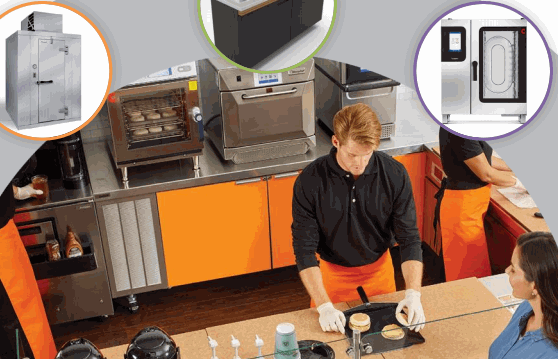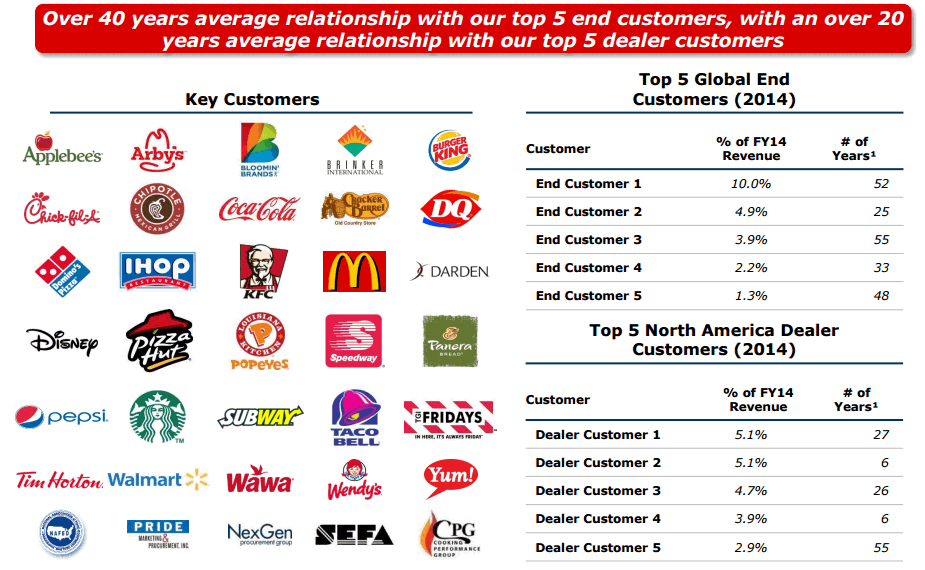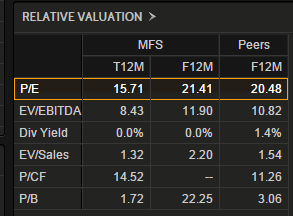- Commercial equipment manufacturer for leading food and beverage companies around the world.
- Inherited a large debt of $1.4 billion after separation from its parent company.
- Does not show growth, operates in a competitive field and faces many challenges in the future.
- The stock is not traded cheaply.
Two months ago the crane manufacturer, The Manitowoc Company (MTW), separated via spin off its division for manufacturing food and beverage equipment, Manitowoc Foodservice (MFS, current price around $15). The separation was required, not only because of the utter lack of connection between the two divisions, but also to reveal the true value of every company. While the food and beverage equipment manufacturer is a global leader which sells its products in 100 countries around the world (see some of its customers in the chart below), produces a high profit margin and relies on a solid financial stability, the crane company has low profitability and a high leverage. Indeed, before the separation, Manitowoc traded at a market value of $2.1 billion, and immediately after the spin off the separate companies were traded at $2.8 billion worth, together.
After the separation, MFS has inherited a huge long-term debt of 1.4 billion dollars, which has, of course, severely hit its profitability. If you looked to its annual report, which excludes the interest expense caused by this debt, it will show a net profit of 157 million dollars or 1.14 dollars per share. Not bad. A reasonable, and cheap, P/E of 13. Even the equity will seem high at $1.75 billion, i.e. a Price/Equity of 1.17. In practice, this report does not include the enormous debt with which the company started out, and it appears only in the separation document. Most financial sites have not been updated, so the stock is likely to be perceived as attractive.
If you include the debt and interest expenses it causes, about 98 million a year, you stay with a net income of $45 million in 2015, still not bad, but it is translated to an P/E of 45.6, which is very high. This multiplier is especially high when one recalls that MFS growth is not much. In fact, despite consistent growth in the food service sector and a forecast of further compound growth of about 7% per year until 2018, the company was able to grow by only an average of 3% in 2013 and 2014 and in 2015 sales have even decreased by 0.7%. The large debt also makes the liabilities to be larger than the assets, leading to negative equity of $83.5 million (one of Seeking Alpha contributors has a nice article that presents these things clearly).
MFS is still a company that creates a positive net income, but the overwhelming financing expenses cut out a big part of its operating profit and that is dangerous. You can see it by looking at the interest coverage ratio – the ratio between the operating profits to the interest expenses, which stands at only 1.7. As a rule of thumb, high interest coverage ratio of 4-5 is excellent and when the ratio is less than 2 it is a red-flag of possible financial risk. If revenues shrink and reduce the operating profit, or if the company will have to take on more debt, there is a risk that the operating profit will not be enough to pay the financing costs. This is the safest way to reach bankruptcy. In the company presentation after the separation, management stressed that the intention is not to distribute dividends but to concentrate on reducing the debt. But the free cash flow of the company is around 91 million dollars a year, so even if all goes to repay the debt, interest expenses will decrease only by about $5-6 million a year. In other words, even in 5 years the debt will still be significant. Frankly, the debt reduction strategy contradicts one of the reasons the company did its spin-off, which was to raise funds to expand operations…
Analysts are also not too optimistic about the company, giving it a target price of between $12 (hold, which should actually be a “sold”) and $16 (Market perform). However, it is important to note that most manufacturers of commercial food and beverage equipment are trading at relatively expensive valuations, despite the not-so-high growth of most of them. One of the major players in the industry, Middleby (MIDD), shows good growth of 11%, but it trades at a P/E that is too high for my taste (you can find an interesting short thesis on it here).
Bottom line: MFS is a quality company that sells to a long list of large customers, so I believe that it will keep being profitable and successful. On the other hand, the stock’s valuation is not attractive, especially when the outlook for growth is so low. For the share price to be attractive for purchase, it needs to drop  at least $4-5 or, alternatively, for the company to consistently reduce its debt and improve its operating margin by at least several percents. It is possible, but not easy, given that competitors are breathing down its neck.





Be the first to comment on "Manitowoc Foodservice – a high quality company, but is the price attractive?"